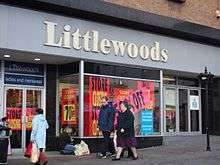Littlewoods
Coordinates: 53°22′2.4″N 2°51′44.2″W / 53.367333°N 2.862278°W
 | |
| Industry | Mail order, Football pools |
|---|---|
| Fate | Merged with Kays Catalogues |
| Successor |
Littlewoods Shop Direct Group Littlewoods.com (online) |
| Founded | 1923 |
| Founder | Sir John Moores |
| Defunct | 2005 |
| Headquarters |
Liverpool, Merseyside, England |
Key people |
Sir John Moores (Founder) David and Frederick Barclay (Final Owners) |
| Owner | Shop Direct Group |
| Parent | Kays Catalogues |
| Subsidiaries | Littlewoods Index |
| Website | littlewoods.com |
.jpg)


Littlewoods was a retail and football betting company founded in Liverpool, Merseyside, England by John Moores in 1923.[1] It grew to become the largest private company in Europe by the 1980s but declined in the face of increased competition from rivals and the Internet. Today the brand name remains as part of Shop Direct Group although the original company once employing 4,000 people has been broken up.
History
The original company began in 1923 as a football pools (sports betting) company, known as Littlewood Pools.[2] After making a loss in the first season of operation, John Moores' original partners withdrew from the venture. Moores persisted with family assistance and by 1932 was in a position to expand the business into mail-order retailing. The first mail-order catalogue was sent to existing subscribers to the pools and the take up – mostly women – formed 'clubs'. Effectively, they became retail agents, collecting money for goods ordered from the catalogue from friends and family and distributing goods shipped to them. The mail-order business expanded and the first Littlewoods high-street store opened in 1937.[2][3]
Littlewoods grew as a retail and betting organisation and, at its height, there were about 22,000 employees working there. In 1982, it was the largest private company in Europe.[1] At one time, it was also the largest family-owned firm in the UK.[4]
Retail arm
Littlewoods was among the key retailers to relocate from town-centre stores to new developments, mostly in enterprise zones, to take advantage of the financial incentives they offered. The Merry Hill store, opened on 14 November 1989, was a notable example. The catalogue market was transformed with the emergence of the Internet, and phone transactions slowly diminished after the mid-1990s. It was around this time that Littlewoods began closing its stores, with the outlet at Merry Hill in the West Midlands being one of the first outlets to close in 1996.
In October 2002, the Moores family sold the shopping and catalogue business to David and Frederick Barclay for £750M.[1]
In 2004 Littlewoods was merged with Kays Catalogues to create the Littlewoods Shop Direct Group (now Shop Direct Group). The amalgamation of the two businesses led to the closure of many of both brands' distribution centres. Kays main centres in Worcester and Leeds were closed, while Littlewoods main operations in Liverpool were cut back.
Index was closed down in early 2005, and at the time of its failure it was noted that it had not made a profit for 18 out of its 20 years of operation and was running at a loss of £100M. Half its standalone stores were sold to rival Argos and concessions in its Littlewoods stores were shut.[5][6]
The closure of 119 Littlewoods stores was also announced in 2005. Around 40 stores were sold to the Primark retail business, owned by ABF.[7][8]
See also
References
- 1 2 3 "Littlewoods' John Moores, the father of home shopping". BBC. 17 March 2010. Retrieved 17 March 2014.
- 1 2 "The Littlewoods Organisation plc". International Directory of Company Histories 1992. Encyclopedia.com. Retrieved 17 March 2014.
- ↑ "Littlewoods Catalogue Home Shopping: the 1930s continued". thecatalogshop. Retrieved 17 March 2014.
- ↑ "Game over or extra time? Liverpool art deco gem faces demolition". Save Britain's Heritage. Retrieved 17 March 2014.
- ↑ Patrick, Aaron (18 April 2005). "Littlewoods selling off catalogue stores after losses of £100m". Daily Telegraph. Retrieved 17 March 2014.
- ↑ "Jobs to go as Index stores close". BBC News. 19 April 2005. Retrieved 17 March 2014.
- ↑ "Littlewoods shops sold for £409m". BBC. 11 July 2005. Retrieved 17 March 2014.
- ↑ "Littlewoods 'mulling stores sale'". BBC. 30 January 2005. Retrieved 17 March 2014.